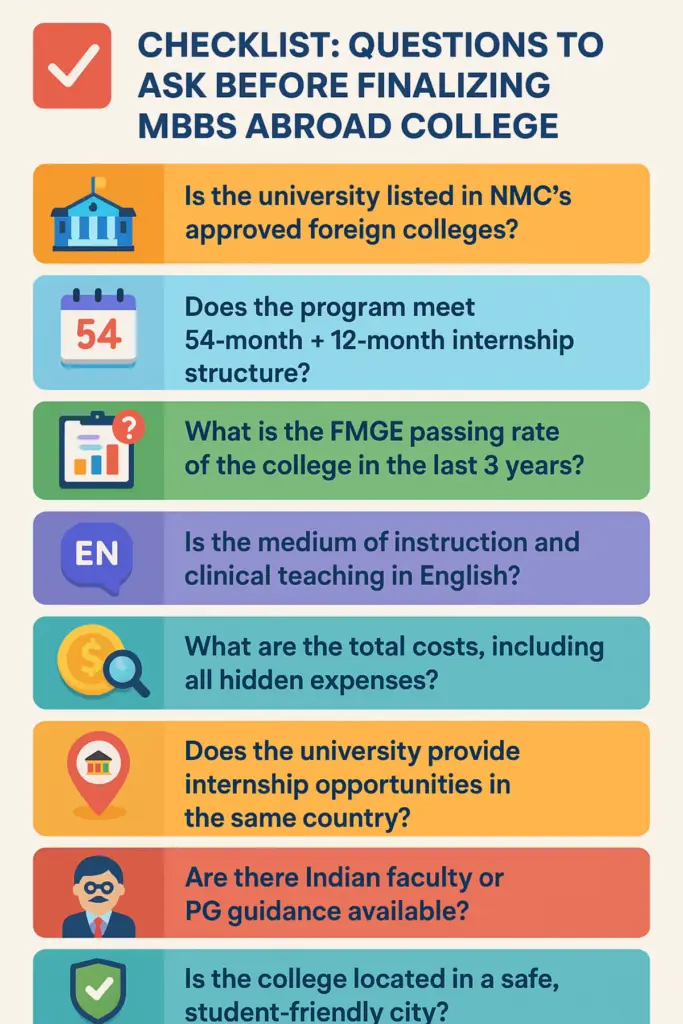NEET UG 2025: Every year, thousands of NEET aspirants choose MBBS abroad to pursue their dream of becoming a doctor. The rising competition, limited government seats, and high tuition fees of Indian private medical colleges have made MBBS abroad a popular choice. Countries like Russia, Georgia, Kazakhstan, Kyrgyzstan, Bangladesh, Nepal, and Malaysia offer affordable, NMC-approved medical programs with good infrastructure.
However, not every foreign medical college has the required quality or recognition needed for a successful career in India. Choosing the wrong college can lead to financial loss, poor education, FMGE failure, or disqualification to practice in India.
In this article, we highlight the 5 most common mistakes Indian students make while choosing an MBBS abroad college after NEET 2025, and how to avoid them.
1. Not Checking NMC Approval and Eligibility Criteria
Mistake: Choosing a foreign university without confirming if it’s NMC-approved or meets the latest eligibility guidelines for Indian students.
Why It’s a Problem:
If your foreign MBBS college is not approved by the National Medical Commission (NMC), you won’t be eligible to sit for the FMGE (Foreign Medical Graduate Examination) or register to practice in India. Additionally, new NMC rules require students to study:
- A 54-month MBBS curriculum
- A 12-month supervised internship
- In a country where licensing to practice is mandatory after MBBS
What You Should Do:
- Always verify your shortlisted college in the NMC’s updated list of recognised foreign institutions: www.nmc.org.in
- Ensure the degree structure complies with the NMC Gazette 2021 norms:
- Same MBBS program as local citizens
- Internship in the same country
- Recognised by the country’s medical council
- Avoid agents who push shortcut or 4.5-year MBBS degrees without valid internship options.

2. Ignoring FMGE Passing Rate and Clinical Exposure
Mistake: Choosing a country or university without researching their FMGE passing rate or hospital tie-ups for clinical training.
Why It’s a Problem:
The FMGE passing rate is a strong indicator of the quality of teaching and clinical training at foreign universities. Many low-cost MBBS abroad programs lack proper clinical exposure, real patients, or English-speaking instructors. It leads to poor preparation for licensing exams in India.
What You Should Do:
- Choose countries and colleges with a proven FMGE success record:
- Bangladesh and Nepal have 30–40% FMGE passing rates (higher than average)
- Some universities in Russia and Georgia are consistently better
- Kazakhstan and Kyrgyzstan have many low-FMGE-rate colleges; choose carefully
- Ensure the college has its hospital or long-term partnership with a functioning hospital.
- Talk to current Indian students or alumni.
FMGE Pass Rate (Average for Last 5 Years):
| Country | Avg. FMGE Pass Rate |
| Bangladesh | 30–35% |
| Nepal | 30–40% |
| Russia | 18–25% |
| Georgia | 15–25% |
| Kazakhstan | 10–15% |
| Kyrgyzstan | 10–15% |
| Malaysia | 25-30% |
3. Falling for Low Fees Without Understanding Total Cost
Mistake: Attracted by promotional advertisements that promise an MBBS degree for ₹15–20 lakh, without calculating the complete 6-year cost, including living expenses.
Why It’s a Problem:
Many universities quote only tuition fees. Actual expenses may include:
- Hostel, food, travel, books
- Medical insurance
- Visa extension, flight costs
- Internship or licensing charges in the country
This can inflate the real MBBS cost abroad to ₹30–50 lakh or more, depending on location and lifestyle.
What You Should Do:
- Ask for a country-wise and year-wise cost sheet, including:
- Tuition fee
- Hostel + mess charges
- Hidden charges (exam fees, conversion fee, etc.)
- Compare that with the average cost of living in each country.
- Explore education loan options through banks like SBI, BOB, or Axis Bank, which now fund NMC-approved foreign MBBS colleges.
MBBS Abroad Cost Estimate (2025:
| Country | Total Approx. Cost (₹) |
| Bangladesh | ₹35–50 lakh |
| Nepal | ₹40–60 lakh |
| Russia | ₹25–40 lakh |
| Georgia | ₹35–55 lakh |
| Kazakhstan | ₹20–30 lakh |
| Kyrgyzstan | ₹22–35 lakh |
| Malaysia | ₹40–60 lakh |
4. Skipping Language and Lifestyle Compatibility
Mistake: Opting for a country where the medium of instruction is not English, or the climate, culture, and lifestyle are difficult to adjust to.
Why It’s a Problem:
In many Russian, Chinese, and Central Asian colleges, while classroom instruction is in English, clinical interaction happens in the local language. Students face difficulty during clinical rounds, affecting practical skills and FMGE preparation.
Likewise, extreme cold weather, different food habits, and a lack of the Indian community can lead to stress or dropout.
What You Should Do:
- Check whether the entire course + hospital interaction is in English.
- Choose countries with a warmer climate and familiar food habits if you have dietary or health concerns.
- Prefer cities with a decent Indian student population and embassy support.
- Consider proximity to India for easy travel and family visits—Nepal, Bangladesh, and Malaysia score high here.
5. Trusting Unverified Agents or Middlemen
Mistake: Blindly trusting agents who promise guaranteed MBBS seats abroad, easy visa approval, or “direct admissions” in top colleges.
Why It’s a Problem:
Many students fall into the traps of:
- Fake or unrecognised universities
- Misleading fee structures
- False promises of FMGE success
- Non-transparent refund or withdrawal policies
In worst cases, students have lost lakhs of rupees and valuable years due to such scams.
What You Should Do:
- Only apply through university-authorised admission offices or their listed India representatives.
- Verify the consultant’s track record, transparency, and written agreements.
- Ask for a copy of the admission letter, fee structure, visa documents, and NMC compliance declaration.
- Connect with Indian students currently studying at that university before finalising.
Studying MBBS abroad is a golden opportunity for NEET 2025 aspirants who may not secure a government seat in India. However, this decision must be based on facts. NMC recognition, academic quality, FMGE performance, and total affordability are non-negotiable factors.
Avoiding these five major mistakes can help you choose the right path toward a successful medical career. Remember, MBBS abroad is not a shortcut, it’s an investment that needs the right planning and awareness.

